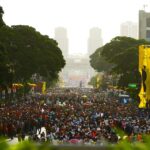Last week, the US Secretary of State. UU., Mike Pompeo, made a visit to Colombia and Brazil, practically in parallel to the meeting of the Lima Group in Peru. Thus, the issues addressed and the final document of Lima should not be separated from the purposes and the tacit and explicit messages of that tour. Pompeo has sought the support of two key leaders of the regional right, Iván Duque and Jair Bolsonaro, to add them to the “reinforcement for a democratic government and human rights in Venezuela, Cuba and Nicaragua.” [1]
Mike Pompeo traveled to Brasilia as the representative of The USs at the inauguration of Jair Bolsonaro. Along with his Brazilian counterpart, Foreign Minister Ernesto Araújo, highlighted the intentions to strengthen trade and security relations with Brazil, [2] as well as the commitment to work together against the triad “of evil” (in reference to Venezuela , Cuba and Nicaragua). In his first interview as president, Bolsonaro referred to the joint military exercises held in December between Russia and Venezuela on Venezuelan soil warning that “Brazil has to worry about it,” adding that “the Armed Forces are the last obstacle to socialism “.[3] Do not forget that, in various public events, Bolsonaro criticized the governments of the Workers Party (PT) for having denied the use of the base of Alcántara (Maranhão) to the United States [4]. In addition, his Government talks about the possibility of transferring another base to the US.
With the president of Colombia Mike Pompeo tackled not only the actions against the current government in Venezuela -promoted by Colombia- but also referred to the “issue of drug trafficking” (which is the axis of bilateral relations since the implementation of the Plan Colombia). He insisted on the reactivation of the fumigation of coca and poppy crops with glyphosate and the persecution of the peasants who work in these crops. [5] Decisions such as these could destroy the Peace Agreements aimed at replacing crops, agreed with the peasantry and led by the State with funding and inter-institutional support.
On this trip Pompeo also met (in Brasilia) with the Minister of Foreign Affairs of Peru, Néstor Popolizio Bardales, where they spoke about “the need to increase pressure on the Maduro regime to restore democracy and prosperity to the Venezuelan people” [ 6] -curiously, little relevance was given to the political and institutional crisis that plagues Peru.
The Pompeo tour and the flaming meeting of the Lima group have a geo-political and geo-economic scope that transcends the attacks on the Venezuelan Government, even though these are the center of their action. The Group is the perfect excuse to unite around the interests of Americans to countries that share the geopolitical vision that the United States has for Latin America and the Caribbean (LAC) and that happens, in the first instance, to isolate first and then overthrow the Venezuelan Government, to achieve a homogeneous order where no country out of the scope of its influence.
In a context of expansion of the Chinese and Russian presence in the region, the US would seem to be willing to reinforce some alliances, showing a very different attitude to the “isolationist” discourse that it outlines in other contexts. The trade war with China expresses one of the challenges posed by the Southern Command and the National Defense Strategy, in which China is identified as a “predator”. The Chinese bases (military or space) in countries such as Nicaragua, El Salvador, Bolivia, Venezuela and Argentina appear as a military correlate of said “commercial war”. In turn, Brazil, Chile and Peru have China as their main trading partner, also highlighting investments in infrastructure projects. However, the main military partner of the countries in the region is the US, in a context of increased military spending in the region, highlighting the purchases of Colombia, Brazil and Argentina to the country of the North, in addition to the accelerated approach of the US with the Ecuador of Lenín Moreno. [7]
Last, but not least, the US government, which is trying to make the most of this return of the right, is being strongly challenged at the national level and with less and less international legitimacy. This week the debate in the Congress was renewed on the possibility of an impeachment (judgment of impeachment) against Donald Trump, impelled by the democrats in the House of Representatives. [8]
The Lima Group in action and the functionality of Venezuela
The lack of consensus within the Organization of American States (OAS) to resolve the “case of Venezuela” led several of the countries most aligned with the US interests in the region to create the Lima Group, a multilateral entity whose main purpose is to overthrow the Venezuelan government with the excuse of finding a way out of the political crisis between opposition and Chavez. It is the “undemocratic route” [9] to reconfigure the regional geopolitical map that, with the arrival of presidents such as Jair Bolsonaro in Brazil, tilts the balance towards the right wing of LAC.
However, it seems that consensus does not exist either within the Lima Group. At the meeting on January 4, scheduled to add greater sanctions to Venezuela and ignore the new mandate of Nicolás Maduro that starts on January 10, Mexico decided not to join the final declaration, which was signed by 13 of the 14 countries present ( Argentina, Brazil, Canada, Colombia, Costa Rica, Chile, Guatemala, Guyana, Honduras, Panama, Paraguay and Saint Lucia).
The new Government of Andrés Manuel López Obrador (AMLO) in Mexico has opted to follow a principled foreign policy, heir to the revolutionary foreign policy of the Institutional Revolutionary Party (PRI) until the arrival of its neoliberal presidents. This external action of the Mexican State is based on principles such as non-intervention in matters of third countries, respect for sovereignty, non-interference, non-pronouncement on the legitimacy or otherwise of a Government, or the equality of States in the international concert. His refusal to sign the declaration of January 4, based on these principles, is a sample of the possible counterweight that can be exercised by the Mexican government against the isolation strategies implemented in multilateral instances towards countries not aligned with US policy. If we continue along these lines, Mexico’s foreign policy would open up new perspectives in regional politics, which would help in rearming the geopolitical project of the Latin American-Caribbean left.
On the other hand, for some member countries of the Lima Group, the accusatory finger against Venezuela turns out to be an escape valve to the own difficulties in domestic politics. If the situations are reviewed in each of these countries, the least that is observed is stability. With some exceptions, these governments are questioned and in 2019 they will face electoral processes. The anti-Venezuela action is shown, in that way, functional to the upcoming elections, because they will have material for their hate campaigns, false news and polarization linking the opponents (especially progressives) with the Venezuelan Government, as it comes being the costume for years.
Finally, it is a serious matter to declare a president elected by popular vote not to assume his mandate, as the Lima Group has just done. It is a characteristic of the conservative offensive that appears as a response to the integration and democratic agreement and respect for the sovereignty that constituted UNASUR and CELAC, but also risky, because it raises a regional polarization that can trigger a warlike escalation of uncertainty results. Venezuela, the country with the greatest energy resources in the continent, is besieged by neighbors such as Colombia, which have energy problems in sight – because their oil reserves are about to become extinct – or Argentina and Brazil, which need to sell products and exit the crisis that the neoliberal measures are provoking, and for the Mesoamerican and Caribbean countries a drop of oil is good business. The opportunity that for these countries represents to be able to enter an eventual distribution of Venezuelan oil is clear.
The important thing (or what the Lima Group hides)
The meeting in Lima leaves open three reflections that underlie their anti-Venezuela action: 1) They are countries that are obsequiously following the booklet of the US of intervention on Venezuela, Cuba and Nicaragua; 2) These countries use rhetoric and anti-Venezuela actions to decompress the internal crisis they have in their national realities, making it functional to conservative electoral campaigns; and 3) These countries, in economic and energy difficulties, prepare a plundering plan for Venezuela with which they intend to solve their demands for gas, oil, gold, and the placement of manufactured and industrial products.
In short, after the rhetoric of defense of human rights, democracy or legality that centers the declaration of the Lima Group on Venezuela, we find the interests associated with the geopolitical and geoeconomic expansion of the United States and its regional allies. Once again, Venezuela is used, as before were other countries, to symbolize the “bad example” that the US is not willing to tolerate in LAC, its strategic reserve.
By Arantxa Tirado, Javier Calderón Castillo, Silvina Romano, Tamara Lajtman y Aníbal García Fernández
[1] https://translations.state.gov/2019/01/02/reunion-del-secretario-pompeo-con-el-presidente-brasileno-jair-bolsonaro
[2] https://translations.state.gov/2019/01/02/secretary-of-estado-mike-r-pompeo-y-ministro-de-relaciones-exteriores-ernesto-araujo-en-sesion-con -the-press /
[3] https://noticias.uol.com.br/internacional/ultimas-noticias/2019/01/03/bolsonaro-admite-que-estados-unidos-podem-ter-uma-base-militar-no-brasil .htm?
[4] https://www.celag.org/bolsonaro-eeuu-union-dos-grandes/
[5] https://www.dw.com/es/objectives-of-mike-pompeo-en-colombia/av-46938675
[6] https://translations.state.gov/2019/01/01/reunion-del-secretario-pompeo-con-el-ministro-de-relaciones-exteriores-del-peru-nestor-popolizio-bardales
[7] https://www.celag.org/escenarios-perspectivas-ee-uu-america-latina/
[8] https://abcnews.go.com/Politics/nancy-pelosi-impeachment-indictment-president-trump-open-questions/story?id=60135980
[9] https://www.celag.org/grupo-de-lima-la-via-no-democratica/
Translated by JRE
| Website





